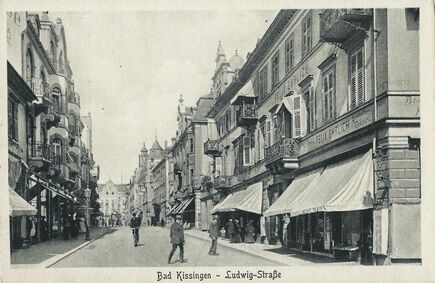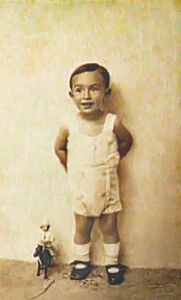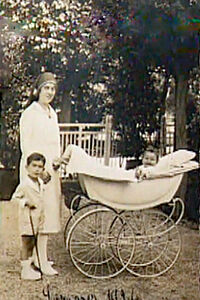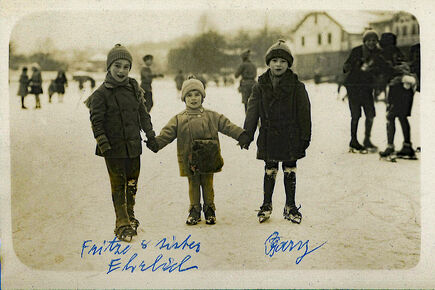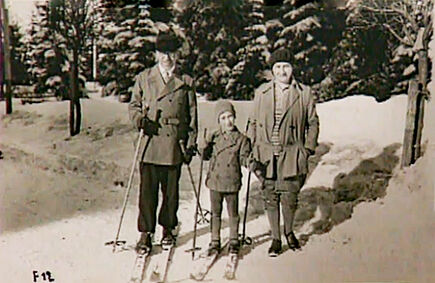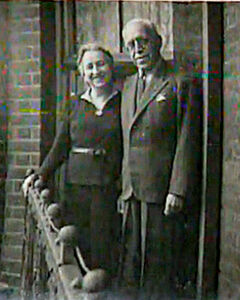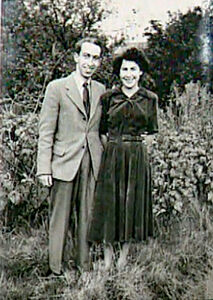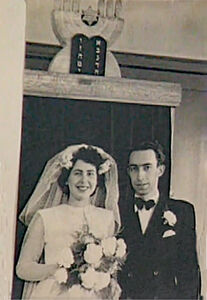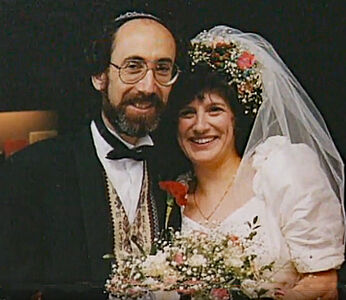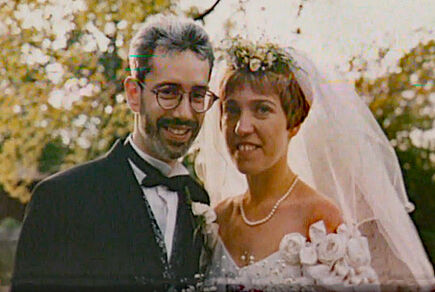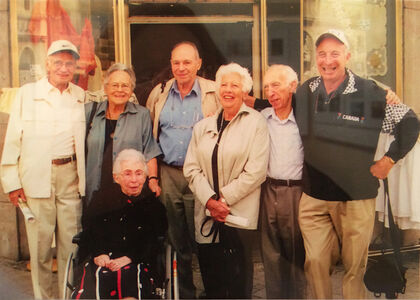personal data
Ehrlich Fritz (Fred)
Parents: Franz and Adele Ehrlich née Leven
Siblings: Felicitas (Liesel) m. Schreiber
Spouse: Ellen née Ramsay
Ludwigstraße 17 (now 10)
April 1937 emigrated to London
biography
Fritz Ehrlich was born in Bad Kissingen on November 15, 1922 as the first child of Franz and Adele Ehrlich into a wealthy and respected Jewish merchant’s family. His father ran the renowned “Modehaus Felix Ehrlich” in Ludwigstrasse together with his brother Ludwig.
Initially, Fritz had a careless childhood before the National Socialists seized power. His hobbies included riding his bicycle through the neighborhood, playing soccer with other boys on the Ehrlichs' property next to the Jewish cemetery, skating on the ice rink in the Rosenviertel in winter or skiing in the Rhön. Looking back, Fritz Ehrlich (who called himself Fred after his emigration) describes himself as a reserved, rather quiet child who did not find it easy to make friends (USC Shoa Foundation, Visual History Archive, Interview mit ![]() Fred Ehrlich)
Fred Ehrlich)![]() . However, there was never any boredom in the large Ehrlichs house. Fritz remembers that "we were all one, enormous, big family. And especially during school holidays, other cousins and their children turned up, [...] and planted themselves on the Ehrlich house and garden. And there was always lots and lots of family around" (ibid.).
. However, there was never any boredom in the large Ehrlichs house. Fritz remembers that "we were all one, enormous, big family. And especially during school holidays, other cousins and their children turned up, [...] and planted themselves on the Ehrlich house and garden. And there was always lots and lots of family around" (ibid.).
The high Jewish holidays were celebrated in the family circle. "The Seder - when the whole family came together - always consisted of at least two dozen people. This traditionally took place in my great-aunt Ida's apartment. [...] It was a very jolly affair" (ibid.).
Fritz's parents were members of the Jewish community. They met with their Jewish friends for social gatherings and perhaps once a year organized a theater performance or a fancy costume party on Purim (cf. ibid.). However, they did not adhere too strictly to the religious rules; they only went to synagogue irregularly, always on the high holidays, and Fritz' family did not attach importance to kosher food. The Ehrlichs' liberal and tolerant attitude was also reflected in the fact that housekeeping, cooking and child-rearing were in the hands of a Catholic housekeeper. "We had a housekeeper called Anna. Because my mother worked full-time, and very long hours, and very hard in the shop. The household was run by a wonderful person called Anna [...] She was not Jewish. She was Catholic, very religious, and had lots of time-- as much time off she wanted to go to church every Sunday, every Christmas, and Easter. But she was very, very friendly with us, and she certainly brought my sister up, and brought me up, as much as anybody else. And her cooking was superb" (ibid.).
Fritz initially attended elementary school for four years in a huge class of 52 pupils, including five Jewish classmates. In May 1933, he transferred to Kissingen Realschule and attended it with good marks till the end of class 3 in the school year of 1935/36. But the Nazi ideology naturally found its way more and more into the school after the National Socialists came to power, so that Fritz found the lessons "atrocious": „I remember that the so-called French teacher told us all about his heroic deeds in the war 14-18 instead of teaching us French" (ibid.). Fritz Ehrlich remembers an episode from music lessons. Part of the music lessons consisted of each child having to stand up and sing a song in front of the class and receive a mark for it. And of course, I was far too shy, with all the antisemitism and the-- the electric atmosphere, to do this. But he begged me to. So my father, who was a very capable man-- he played a little bit of piano-- he taught me a song-- a German folk song called 'Ich hatt' einen Kameraden'-- 'I once had a comrade; a better one you don't find.' And he taught me that. And I stood up in class and sang it. And it's to Riegl's [name of the music teacher] credit that he gave me mark 2. I'm sure I deserved only mark 5, because I've got no voice at all. But I think he gave me mark 2 for effort.
It was many years later that I realized the full meaning of why my father had chosen that song to teach me, and not another one. It had a very special meaning for him. "Because what hit my father the hardest in Germany in the early days of National Socialism was that his friends and acquaintances would no longer speak to him. They crossed the road when they met him in town, rather than have to greet him. And given the tough life he shared with these people when they survived the war from 14 to 18 [...], he found it very difficult to accept this hostility from his friends. I thought I should mention that. I think it's a nice little story" (ibid.).
Fritz also increasingly felt the ostracism. The other boys his age were in the „Hitlerjugend", from which the Jewish boys were excluded. „And at that age, between 10 and 13, you really wished you were there. [...] When you saw the Nazis-- of your school marching in uniform behind a brass bands through the streets, and you looked out of the window, you instinctively wished you were part of it. You felt excluded. You didn't understand why not" (ibid.). On the one hand, Fritz wished to be a part of this movement, on the other hand, the Nazi propaganda had a frightening effect on him, especially when the SA sang anti-Semitic songs such as 'Wenn's Judenblut vom Messer spritzt, geht's noch mal so gut' (When Jewish blood splashes from the knife, it's even better) during their marches. It was a wonderful tune, an easy marching tune. But the words were pretty frightening for little boys. So everybody said, ach, ignore it. It's just a pretty tune. They don't really mean it. In 1933, nobody meant it" (ibid.).
But over the next few years, even a teenager like Fritz was to realize that the Jewish minority was being subjected to ever greater repression. When Fritz returned from school one day, he saw SA men standing in front of their fashion store and not letting any customers in. There was a policeman on the other side of the street who ignored the incident. In front of the entrance stood a SA man „with his legs wide apart and his hands on his hips.[...] And I-- instead of as I usually walked in, through the front door, I slipped through the back door, because I was scared stiff to see him standing there" (ibid.).
From conversations with his parents, Fritz also learned that people were arrested, beaten up and sent back home. And their Catholic housekeeper Anna was subjected to vicious insults in public (“Here comes the Jewish cook!”), but remained loyal to the Ehrlich family.
In 1936 Fritz had to leave secondary school as it was forbidden for Jewish students to attend it. In April 1936 he moved to Coburg (SBK registration card) and, like his cousin Hans Josef (Joske Ereli), attended a Jewish private school. The boarding school was located a little bit outside of Coburg, and since Coburg was a very anti-Semitic city, the Jewish students were not allowed to leave the school grounds under any circumstances.
In the late summer of 1936, the completely clueless Fritz learned that his parents had fled Bad Kissingen and emigrated to England. An acquaintance had warned his father that the Nazis were planning something against him and that he should therefore leave Bad Kissingen as quickly as possible.
Fritz' mother Adele returned to Bad Kissingen once again in 1937, dissolved their apartment and arranged for their two children to leave the country. Franz stayed in England because the risk of arrest in Germany was too high for him. In April 1937, 14-year-old Fritz and his sister Liesel, who was three years younger, boarded a train with their mother and traveled to Holland, taking the ferry to England, where they were initially taken in and supported by his father's uncle Ludi.
During the war, Fritz, who now called himself Fred, found work in Padiham, a small industrial town in Lancashire, where an acquaintance of his uncle Ludi owned a toolmaking company that manufactured grinding wheels. Fred worked there as a mechanic while attending night school, where he studied mechanical engineering, engineering drawing, and production engineering.
When the war ended, he returned to London and lived with his parents again. He also briefly considered emigrating to Palestine, like his younger sister, but when he visited his sister in Israel in 1950, he realized that this was not the right place for him. "At the time, I had the feeling that life in Israel was going to be a tough life. And I thought you would need special skills to make a living in Israel, to make a real contribution. And I didn't think that I was the one. Also I had my parents in London. And I didn't feel I ought to desert them" (ibid.).
IIn 1947/48, when he visited his sister at a training camp where she and her husband were preparing for their agricultural work in Israel, Fred met his future wife Ellen Ramsay, who came from Königsberg in East Prussia (now Kaliningrad). Ellen had also originally planned to emigrate to Palestine. Ellen and Fred decided to stay in England and married in Manchester in March 1950, but for professional reasons they moved to Birmingham, where their first son David was born in 1953. Their second son Dan was born seven years later.
After his bitter experiences during the Nazi era, Fred Ehrlich did not want to visit Bad Kissingen, the town of his birth, for a long time. In an interview in 1998, he said: "I've not been to Bad Kissingen. My cousins have all gone and had a look, gone back from Israel, and from America. They've gone back. I haven't gone back.[...] I've been to Germany several times for the company I worked for". During a visit near Essen, I was „introduced to various peoples my own age and older. And as Mr Ehrlich, from London. And there wasn't one who had-- oh, that's going back 30 years. There wasn't one there who had the courage to say, 'How comes you come from London with a German name? How comes you speak German?' Not one had the courage to say anything. So I said, 'Well, that's how you feel about it, I can do without you.'" (ibid.).
Three years later, Fred Ehrlich also came to his hometown for the Ehrlich family reunion in the summer of 2001, and it was undoubtedly a moving moment for him to see family members from all over the world in this place again.
In June 2016, Fred Ehrlich died in Birmingham at the age of 94.
References
(USC Shoa Foundation, Visual History Archive, Interview mit Fred Ehrlich![]() , ins Deutsche übersetzt) (Das Interview ermöglicht einen sehr persönlichen Einblick in Fred Ehrlichs Biografie)
, ins Deutsche übersetzt) (Das Interview ermöglicht einen sehr persönlichen Einblick in Fred Ehrlichs Biografie)
Joske Ereli, Von Hampi Ehrlich zu Jossle Ereli - Meine Lebensgeschichte
Hans-Jürgen Beck, Kissingen war unsere Heimat, Stand April 2017, S. 581, 585, 599
Schülerakte Jack-Steinberger-Gymnasium
Meldeunterlagen Stadt Bad Kissingen
US Holocaust Memorial Museum/Holocaust Survivors…![]()
Todesnotiz in „The Gazette“, 8. July 2016![]()
Datenbank Findmypast, England & Wales Marriages 1837-2005![]()
Photo credits
beim Schlittschuhlaufen © Judy Heymann Kazan (weitergeleitet von Hans-Jürgen Beck)
weitere Fotos © Joske Ereli, Ein Gedi und Fred Ehrlich, Birmingham
Back
